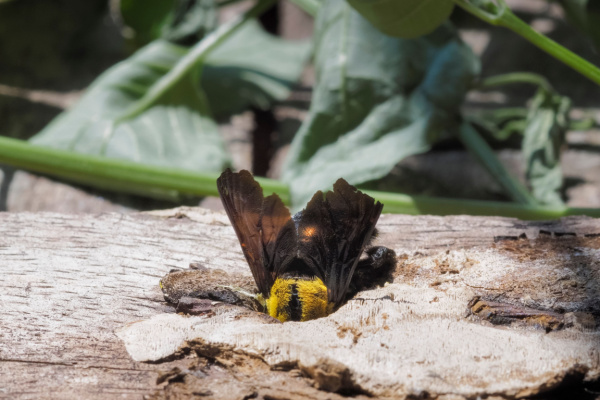We can all agree that we don’t like the holes that carpenter bees bore into our pergolas, patios, potting benches, fences and outdoor buildings. So when those great big bees show up in the spring, we’re unfortunately reminded as to how they got their name. The females get to work chewing holes into trees and wooden structures so they can lay their eggs. Carpenter bees make holes so fast, you’d think they were flying around with a tiny power drill.
But before you come up with a plan on how to get rid of carpenter bees with pesticides or even earth-friendly bee traps, remember that these gentle giants are pollinators. According to HGTV.com, their visits to eggplants, tomatoes, blueberries and a slew of other vegetables and flowers help these plants produce crops we value. Carpenter bees often work with honey bees to pollinate, so these wood-chewing insects are actually a force for good.
On top of that, carpenter bees don’t sting you. They’re docile creatures, says Dr. Keith Delaplane, director of the Honey Bee Program at the University of Georgia. And compared to say, termites, they don’t do a ton of damage to structures, Delaplane says. Your porch isn’t likely to collapse from carpenter bee damage. This is because carpenter bees reproduce at such a slow rate that you won’t get a catastrophic swarm of them. While a termite queen can live for 20 years, a carpenter bee lives for a couple of years, tops.
“All told, I kinda like the goofy guys and enjoy watching their territorial capering in spring,” Delaplane says. So, instead of trying to get rid of carpenter bees, try looking for ways to deter them from drilling holes in your wooden structures. Consider learning how to co-exist with these insects without killing them. Below are some ways to do just that, from the home and garden experts at HGTV.
Apply a Citrus-Oil Based Spray
Carpenter bees avoid strong smells. You can make a DIY spray with essential oils, or buy a commercially prepared product. Carpenter bees don’t like cinnamon, spearmint or peppermint, says Dr. Dan Suiter, professor of urban entomology with the College of Agricultural and Environmental Sciences at UGA. Sprays made with those essential oils repel the creatures. The best time to put essential oils on your deck, patio posts or potting bench is in the spring, when female carpenter bees are scouting for a place to make a nest.
Plug Carpenter Bee Holes ASAP
Since female carpenter bees drill these tunnels in your deck rail to lay eggs, they’re going to put them out of sight, where they’re safe from predators and the elements. “Be vigilant. Look (for holes) in places that are going to be protected from rain and probably out of your eyesight,” says Dr. Brian Forschler, a professor of entomology at UGA. When you find a carpenter bee hole, stuff a mothball in it and then plug it with foil, wood putty or caulk, Forschler says. “The mothball debilitates the animals that are in there and prevents them from chewing back out of your plugs.” You can also stuff a cotton ball soaked in rubbing alcohol into the nest and then seal off the hole. Generations of carpenter bees return to these holes year after year to nest, Suiter says. “They literally go back to where they were born and crawl inside to lay more eggs.” If you seal up their ancestral home, the bees may move on to another location.
Build With Treated Wood
Yes, carpenter bees can bore through treated wood, but they’re less likely to do so if you use wood that has been pressure-treated to resist insects and the elements.
Paint Outdoor Structures
Yes, carpenter bees can bore through painted wood, but again, they’re less likely to do so. We’re looking for deterrents here, not a magic cure.
Replace Damaged Wood
Instead of fretting about how to get rid of carpenter bees, replace the wood they have damaged. “You can just learn to tolerate damage and then replace the wood every five years,” Forschler says. “Most people aren’t going to go along with that, I know,” he says. “But I’ve really been on this kick of coexistence with these animals, given the fact that they’ve been roaming this earth for 160 million years and our societies have intruded in their world only the last few thousand years,” Dr. Forschler says. “They’re going to be here way after we’re gone.”
But you still say you don’t want to co-exist with carpenter bees …
Pollinator, schmollinator, you want these bees gone. That’s your choice. Just don’t reach for pesticide, please. Pesticides aren’t good for you, your pets, or the environment, either.
—
Photo Credit: Yuttana Joe / Shutterstock.com
